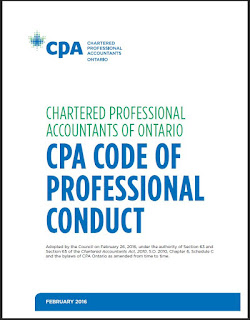A 2004 dissertation empirically examined the impact of
ethics instruction and ability on student propensity to use professional
judgment in resolving accounting ethics dilemmas. The literature has supported
the need for increased ethics instruction in accounting programs as a vehicle
to improve ethical decision making in the accounting profession. The
significance of the American Institute of Certified Public Accountants (AICPA;
2004) Code of Professional Conduct as
the profession’s source of authority relative to ethical decision making was
documented.
The Code emphasizes three trust characteristics (ability,
benevolence, and integrity) identified in the literature that are important
relative to enhancing public trust in the accounting profession. Ability is important
to ethics instruction as it determines the extent to which students acquire a working
knowledge of the provisions of the AICPA
Code of Professional Conduct. The ethical norms contained in the Code’s
provisions are derived from the underlying ethical decision-making
characteristics inherent in the accounting profession’s organizational culture.
These characteristics relate to an individual’s ethics system, ethics
application perspective, moral reasoning perspective and level of moral reasoning.
The literature has supported a deontological ethics system,
holistic ethics application perspective, orthodox moral reasoning perspective,
and conventional level of moral reasoning as appropriate for ethical decision
making in the accounting profession. All of these characteristics point to the
use of professional judgment rather than personal judgment in the resolution of
accounting ethics dilemmas.
According to the author, there are several avenues for
future research efforts relative to increasing the use of professional judgment
in present and future accounting leaders and ultimately enhancing public trust
in the accounting profession. They are (a) replicating the study’s repeated
measures experiment to other sample frames within the sample population, (b) extending
the repeated measures experiment to other sample populations, (c) conducting a
longitudinal study involving student use of professional judgment, (d)
preparing and conducting repeated measures experiments that evaluate the impact
of the other important trust characteristics of benevolence and integrity on
student use of professional judgment, and (e) developing and testing a
comprehensive model of professional judgment that incorporates all three of the
important characteristics that enhance public trust.
This 100-page dissertation is available online. For more information,
read, Enhancing Public Trust in the Accounting
Profession Using Professional Judgment Rather Than Personal Judgment in
Resolving Accounting Ethics Dilemmas, by Gene R. Sullivan submitted in April
2004 to Regent University School of Leadership Studies in partial fulfillment
of the requirements for the degree of Doctor of Philosophy in Organizational
Leadership.



